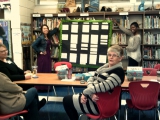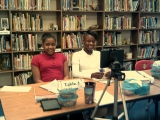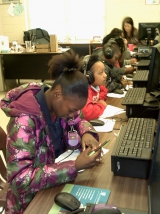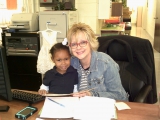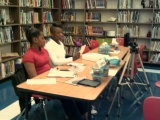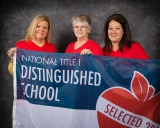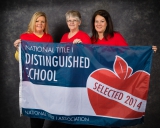-
Category 2
Selected in 2014
-
Grades: pre k - 5
School Setting: urban
Town Population: 66,075
Student Enrollment: 335
Student Demographics:
Black/African American: 98%
Teacher/Student Ratio: 1:24
White/Caucasian: 2%
Hispanic: 0%
Hawaiian/Pacific Islander: 0%
Asian: 0%
Native American: 0%
Other: 0%
% Reduced Lunch: 98%
% ELL Learners: 0%
Founded: 1967 -
PRINCIPAL:
Pam Wilcox -
CONTACT:
2700 Poplar Street
North Little Rock, AR 72114
501-771-8025
ratliffk@nlrsd.org
Seventh Street Elementary
North Little Rock, AR
Teachers that work at Seventh Street want to teach. We believe we can make a difference in the life of a child and they expect every student to succeed. To make that happen, the entire staff has to be aware and understand the circumstances our students face each day.
- Describe specific programs in place to ensure that families are involved in the success of your school and students.
-
Parent meetings are held once a month at Seventh Street. Each meeting has a different purpose and is designed to be helpful to parents.
One meeting was based on easy art activities parents and children could do together at home. The parents completed one project during the meeting and received directions and supplies for projects that could be completed at home.
During a cooking meeting, parents helped to cook a simple meal. They were able to sample the finished product. Parents took home recipes and ingredients so the same meal could be cooked at home for their families.
A finance officer from a local bank talked to parents about protecting their identity, information that should not be given over the internet, and suggestions on ways to budget their money. Parents were able to talk privately to the finance officer and were given several informational pamphlets to take home.
During the reading, math, and science night, parents and students rotate from one table to another to participate in activities. Teachers are at every table to give directions and to explain how the activity benefits the students’ learning. Parents and students are able to take the projects they create home.
Students take home a book in a bag every night. The student reads the book, reads the book to the parent, or the parent reads the book to the student. The parent signs a form each night after the reading. Students are recognized and their picture is placed on the reading wall every time their parent signs the form stating that the student has read ten books. Students and parents enjoy seeing the pictures on the wall.
Once a month we have a Star Café set up in the front hall of the school. Parents are encouraged to enjoy juice, coffee, and Danish. Different teachers and the principal serve the parents which provide an opportunity for pleasant conversations. This builds trust between school and home.
Our parents have different schedules. Many of them work at night and are unable to attend meetings so we plan our events and meetings at different times. Meetings are rotated from morning meetings, afternoon meetings, and evening meetings. We send several notes home, put information in our monthly newsletter, and post information on a sign outside our building. Parents are welcomed as they enter the building and are thanked for being involved with their student.
- Describe the most successful activity your school has initiated to strengthen ties to your community.
-
Engaging Families and Community
“Come One, Come All to Seventh Street’s Carnival Open House”. This innovative idea helped us get parents to come to our Open House. The week before school starts, our staff members went to student’s homes to welcome them to the coming school year. The staff left flyers with information at each home. Flyers were also left at local businesses and churches.
A neighbor church brought a huge bar-b-q grill and furnished hot dogs, buns, and drinks for everyone. Volunteers from local businesses set up games in the cafeteria. Churches, businesses, Sororities, and Women’s Groups provides school supplies. The school is decorated like a carnival with games and balloons everywhere.
The night of Open House, parents and students visit classrooms where their new teacher welcome them to school and give them a listed of needed school supplies. She also gives the families tickets for free hot dogs. After the classroom visit, the families head to the cafeteria for carnival activities. Every time the children play a game they receive a school supply item from their list. When the children finish playing games, and have all of their school supplies, the families enjoy free hotdogs and drinks.
Every year, we receive free supplies that we that we distribute to classroom teachers. The teachers pass the supplies to students that are unable to furnish their own supplies. Over 90% of our students are unable to furnish their own supplies. Although our parents and students are grateful to receive free supplies, it’s totally different when their children “win” the supplies at a carnival game. The children take ownership of their supplies. They get to take them home, put their names on them and bring them back on the first day of school. The students are so proud of their supplies and they take care of them.
This project involves parents, students, community churches, local businesses, and school staff. Since we started having Carnival Open House or something just as creative, the attendance at Open House has more than tripled. The first meeting between parents and teachers is very positive and a connection is made between home and school. Parents see our school as welcoming, non-threatening, and a friendly place to visit. The attendance at assemblies, PTA meetings, and parent conferences has increased and we contribute the increase to our successful Carnival Open House.
- Describe your philosophy of school change or improvement.
-
Our philosophy is that education is the road out of poverty. We have the highest amount of low socio economics families in the North Little Rock District. We know our students are capable of higher education and we expect our students to attend college. We expect them to have plans for their future. We realize that we are responsible for supplying them with the tools they will need. We know that all children can learn and that they learn at different rates. We assess to determine where a student is in reading and math and we start from there. We have found that differentiation and intervention is the key to student success. A student must have the basic skills in order to continue their learning. Providing interventions at the student’s level help the student understand the objection being taught. Students are more likely to ask questions in a small group setting. Students go back into the whole group setting with confidence when they understand what they are doing. When a student feels confident, they will take risks. They will make attempts to complete assignments. They will try harder to succeed.
Teachers realize the importance of student led discussions. Our students come to school with very little background knowledge. Most of them are one- to- two years academically behind other students their age. They need to have books read to them. They need to have conversations with adults and other students. They need hands-on experiences. The teachers realize this and plan their lessons according to the needs of the students.
Yes, we believe every child can learn. We know children learn at different rates. We know the importance of hands-on experiences. We know that our students are our future and we want to give them every opportunity for them to be everything they want to be because we believe education is the road out of poverty.
- What are your school’s top two goals for the next year?
-
Our top goal for next year is to increase the number of students that are successful on the PARCC assessment. We will continue to use data to guide instruction and determine the need for intervention. Our second goal is to continue to decrease the number of students that receive disciplinary referrals. We do not have a major behavior concern but we want to improve behavior and keep students in the classroom.
- What is the single most important factor in the success of your school that others could replicate?
-
The most important factor that has led to the success of our school is our ability to appreciate the differences in each of our students. Our school has the highest percentage of low socio-economic families in the North Little Rock School District. Teachers that work at Seventh Street want to teach. We believe we can make a difference in the life of a child and they expect every student to succeed. To make that happen, the entire staff has to be aware and understand the circumstances our students face each day. A student couldn’t get her homework done because it got too dark. What she doesn’t say is that her family doesn’t have electricity. A student comes in late and begins to act out. Did that child get to eat breakfast? Many of our students eat breakfast and lunch at school and don’t get anything to eat at home. How can a student succeed when they are hungry? We make sure our students get to eat breakfast and lunch and food bags are sent home on Friday afternoons so they have something to eat over the weekend. We provide clothes, school supplies, and food for our students, but it’s the love we have for them that drives them to succeed.
Interventions have the greatest positive effect on student achievement. Assessment results determine the strengths and weaknesses of each individual and they are given interventions according to their needs. Small groups are pulled to work on core skills. Reading Recovery teachers work with small groups and individuals that are not performing on grade level. Teachers that do not have a regular classroom (music, art, PE, and media) provide intervention to small groups. Groups are changed according to the needs and successes of the students. The Common Core Curriculum Guide is used to assure that every student receives lessons in every academic area.
The year I moved to Seventh Street, there were thirteen new staff members, most of them brand new teachers. Teachers stayed in their rooms after school behind closed doors. Student behavior was out of control. Those days are gone. Today, this school is warm and friendly. Staff members only leave our school if they have been offered a step up in their position or because they are moving out of our area. The staff members that leave always return for special events and celebrations. We stay in contact with each other because we are a family. We care about each other. Student behavior is no longer a concern. We have a behavior policy and have high expectations that are consistent and fair. Parents receive written information on their child’s grades and behavior weekly along with regular phone calls to report good (and not-so-good) information. Teachers collaborate with each other on ideas and suggestions. If there is a behavior concern, teachers know that they have my support. I will not allow one student to prevent another student from learning. I am in every classroom every day. I am a familiar face in the halls and cafeteria. I welcome parents in the morning and talk to them when they pick their children up in the afternoon. Parents make comments about how friendly we are and how they enjoy coming to school to talk to us. Parents know that we care about their families.
- Describe the program or initiative that has had the greatest positive effect on student achievement, including closing achievement or opportunity gaps, if applicable.
-
Our philosophy is that education is the road out of poverty. We have the highest amount of low socio economics families in the North Little Rock District. We know our students are capable of higher education and we expect our students to attend college. We expect them to have plans for their future. We realize that we are responsible for supplying them with the tools they will need. We know that all children can learn and that they learn at different rates. We assess to determine where a student is in reading and math and we start from there. We have found that differentiation and intervention is the key to student success. A student must have the basic skills in order to continue their learning. Providing interventions at the student’s level help the student understand the objection being taught. Students are more likely to ask questions in a small group setting. Students go back into the whole group setting with confidence when they understand what they are doing. When a student feels confident, they will take risks. They will make attempts to complete assignments. They will try harder to succeed.
Teachers realize the importance of student led discussions. Our students come to school with very little background knowledge. Most of them are one- to- two years academically behind other students their age. They need to have books read to them. They need to have conversations with adults and other students. They need hands-on experiences. The teachers realize this and plan their lessons according to the needs of the students.
Yes, we believe every child can learn. We know children learn at different rates. We know the importance of hands-on experiences. We know that our students are our future and we want to give them every opportunity for them to be everything they want to be because we believe education is the road out of poverty.
- Explain how Title I funds are used to support your improvement efforts.
-
Our philosophy is that education is the road out of poverty. We have the highest amount of low socio economics families in the North Little Rock District. We know our students are capable of higher education and we expect our students to attend college. We expect them to have plans for their future. We realize that we are responsible for supplying them with the tools they will need. We know that all children can learn and that they learn at different rates. We assess to determine where a student is in reading and math and we start from there. We have found that differentiation and intervention is the key to student success. A student must have the basic skills in order to continue their learning. Providing interventions at the student’s level help the student understand the objection being taught. Students are more likely to ask questions in a small group setting. Students go back into the whole group setting with confidence when they understand what they are doing. When a student feels confident, they will take risks. They will make attempts to complete assignments. They will try harder to succeed.
Teachers realize the importance of student led discussions. Our students come to school with very little background knowledge. Most of them are one- to- two years academically behind other students their age. They need to have books read to them. They need to have conversations with adults and other students. They need hands-on experiences. The teachers realize this and plan their lessons according to the needs of the students.
Yes, we believe every child can learn. We know children learn at different rates. We know the importance of hands-on experiences. We know that our students are our future and we want to give them every opportunity for them to be everything they want to be because we believe education is the road out of poverty.
- Identify the critical professional development activities you use to improve teaching and student learning.
-
Professional Development
Seventh Street Elementary staff has been involved in a variety of professional development activities used to improve the teaching and learning process. The teachers attended a two-day summer institute in June 2014. The teachers and administrators had ownership to register and attend breakout sessions that fit their needed goals and growth plans. These sessions included a wide range of technology that enhances classroom instruction along with research-based best practices that have shown proven results. The majority of the sessions were taught by fellow teachers who shared their positive strategies for reaching all students in their classrooms. Later in the summer the teachers from Seventh Street shared with each other all the sessions that they had encountered at the summer institute to spread their knowledge more.
Another professional development activity that the staff at Seventh Street was actively involved in was supported by a STEM grant from the University of Arkansas at Little Rock. The sessions focused on science content found in the Common Core State Standards. The teachers were able to use new equipment that had been purchased with grant money.
Teachers had the opportunity to be involved in a series of professional development sessions that included the best methods for reaching all at-risk students using iPads. Teachers were trained on how to create their own lessons for the engagement of students in their classrooms. There are three model classrooms at Seventh Street that are fully implemented and in the school process of having two more added this year.
Most recently, the school started the trainings for becoming a Project Lead the Way school. Project Lead the Way is the nation’s leading consultant for K-12 STEM programs in schools. The Seventh Street teachers will use this program to build the collaboration among their students in solving real world problems with their own unique solutions. These trainings will continue until every teacher at the school has been trained and implementing the program in their classrooms.
- Describe how data is used to improve student achievement and inform decision making.
-
Using Assessment Results
Assessment data is the driving force in our building. Assessment data determines classroom schedules, intervention schedules, fine arts schedules, guided reading groups, intervention groups, and even the lunch schedule. At the beginning of the school year, test results from the previous school year are broken into skills. Teachers work together to record the names of students that were not proficient at each objective. Students are given intervention according to the areas of need. Classroom teachers work with small groups of students in reading and math. Students are pulled by math and literacy coaches to work on skills. When teachers of art, music, and PE have a break in their schedules, they work in classrooms to give extra help to struggling students. The classroom teachers and the computer lab aide plan the programs that students will be working on so that their computer lessons align with classroom lessons.
STAR assessments are given four times a year. Scores are recorded and intervention groups are changed or added according to the needs of the students. The score of almost every student improved from the score of the previous assessment. The results of the assessments are sent home with each student and they are discussed during parent – teacher conferences.
Students participate in a quarterly Common Assessments. The results are discussed during staff meetings and grade level meetings. The scores from the Common Assessments are used along with the STAR Assessment to guide instruction and plan intervention.
Students in kindergarten, first grade, and second grade use Developmental Spelling Test (DSA), DIBELS, and Running Records to determine where a student is academically and to determine the student’s growth.
Individual results from all state mandated tests are sent home. School results are posted in the newspaper, they are posted on our district web page, and pamphlet titled Think World Class, North Little Rock School District, Report to the Community is sent to homes and the community.
- Describe your school culture and explain changes you’ve taken to improve it.
-
The most important factor that has led to the success of our school is our ability to recognize and appreciate the differences in each of our students. Our school has the highest percentage of low socio-economic families in the North Little Rock School District. Teachers that work at Seventh Street want to teach. We believe we can make a difference in the life of a child and they expect every student to succeed. To make that happen, the entire staff has to be aware and understand the circumstances our students face each day. A student couldn’t get her homework done because it got too dark. What she doesn’t say is that her family doesn’t have electricity. A student comes in late and begins to act out. Did that child get to eat breakfast? Many of our students eat breakfast and lunch at school and don’t get anything to eat at home. How can a student succeed when they are hungry? We make sure our students get to eat breakfast and lunch and food bags are sent home on Friday afternoons so they have something to eat over the weekend. We provide clothes, school supplies, and food for our students, but it’s the love we have for them that drives them to succeed.
Interventions have the greatest positive effect on student achievement. Assessment results are determine the strengths and weaknesses of each individual and they are given interventions according to their needs. Small groups are pulled to work on core skills. Reading Recovery teachers work with small groups and individuals that are not performing on grade level. Teachers that do not have a regular classroom (music, art, PE, and media) provide intervention to small groups. Groups are changed according to the needs and successes of the students. The Common Core Curriculum Guide is used to assure that every student receives lessons in every academic area.
The year I moved to Seventh Street, there were thirteen new staff members, most of them brand new teachers. Teachers stayed in their rooms after school behind closed doors. Student behavior was out of control. Those days are gone. Today, this school is warm and friendly. Staff members only leave our school if they have been offered a step up in their position or because they are moving out of our area. The staff members that leave always return for special events and celebrations. We stay in contact with each other because we are a family. We care about each other. Student behavior is no longer a concern. We have a behavior policy and have high expectations that are consistent and fair. Parents receive written information on their child’s grades and behavior weekly along with regular phone calls to report good (and not-so-good) information. Teachers collaborate with each other on ideas and suggestions. If there is a behavior concern, teachers know that they have my support. I will not allow one student to prevent another student from learning. I am in every classroom every day. I am a familiar face in the halls and cafeteria. I welcome parents in the morning and talk to them when they pick their children up in the afternoon. Parents make comments about how friendly we are and how they enjoy coming to school to talk to us. Parents know that we care about their families.
Our top goal for next year is to increase the number of students that are successful on the PARCC assessment. We will continue to use data to guide instruction and determine the need for intervention. Our second goal is to continue to decrease the number of students that receive disciplinary referrals. We do not have a major behavior concern but we want to improve behavior and keep students in the classroom.
Stats
-
Category 2
Selected in 2014
-
Grades: pre k - 5
School Setting: urban
Town Population: 66,075
Student Enrollment: 335
Student Demographics:
Black/African American: 98%
Teacher/Student Ratio: 1:24
White/Caucasian: 2%
Hispanic: 0%
Hawaiian/Pacific Islander: 0%
Asian: 0%
Native American: 0%
Other: 0%
% Reduced Lunch: 98%
% ELL Learners: 0%
Founded: 1967 -
PRINCIPAL:
Pam Wilcox -
CONTACT:
2700 Poplar Street
North Little Rock, AR 72114
501-771-8025
ratliffk@nlrsd.org


